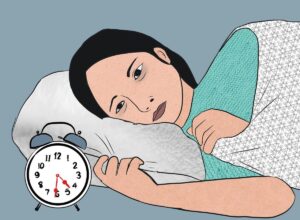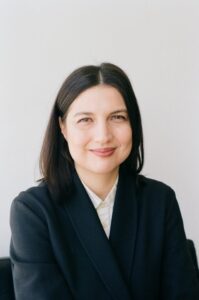Original French version available here: https://css-scs.ca/share-your-sleep-story/histoire-de-marie/
Postmenopause is the time that follows menopause – about a year after the last menstrual period – and which lasts for the rest of one’s life.
During this time, many people report changes with their sleep.
Such is the case for Marie [name changed], a 54-year-old woman I met on a rainy evening.
Right from the start, we performed an exercise. I asked her to associate the word “sleep” with the first thing that came to her mind. Not a second had gone by before she answered: “Insomnia.” Indeed, Marie has had trouble falling asleep before 3 a.m. since she started dealing with the ups and downs of postmenopause.
Marie has always highly valued sleep, but she has become more aware of its importance over the last 15 years. This time matches the stages of perimenopause, menopause, and finally, postmenopause.
“When I was younger, I would notice micro-awakenings during my sleep. Now, I can’t say my sleep is fragmented because my sleep simply isn’t there anymore. My biggest problem is that I look for sleep without finding it!”
When asked how she is doing, without fail Marie replies that she slept poorly.
In fact, she asked herself whether the fact that she began mouth breathing at night could indicate the presence of sleep apnea. She first discussed it with her family doctor. But general practitioners haven’t necessarily developed an expertise in sleep medicine, hence the importance of speaking with them clearly and transparently about the symptoms encountered so that they might, if needed, collaborate with people who did develop this expertise.
The preferred avenue, in Marie’s case, was collaborating with a private doctor, because she didn’t want to wait any longer to know for sure.
Thus, she learned that the hormonal changes she was experiencing as part of postmenopause played a leading role in the presentation of her insomnia and drops in energy levels.
DROPS IN ENERGY LEVELS
To give herself the best chance of success, Marie began by following all the typical sleep hygiene advice: regular bedtime and wake-up time, reduced caffeine consumption, logging off from screens in the evenings, and so on. She even took to hiding her alarm clock to avoid seeing the hours slip through her fingers. Although she initially saw the value of applying these tips, she failed to notice any positive long-term effects.
No matter what measures she took, she still suffered the same drops in energy levels.
The lack of sleep significantly affects my vitality, my concentration and my memory.
If she could speak to other people going through the same thing, Marie would be reassuring and tell them that, in her opinion, the suffering they experience at this time of their lives depends on factors far beyond their control.

MANAGEMENT OF HOT FLASHES AND NIGHT SWEATS
For some time now, Marie has been undergoing hormone replacement therapy. It is a treatment which consists in replacing estrogen and progesterone, which decline after menopause (though their levels vary from perimenopause onwards). This helped her eliminate the hot flashes and night sweats which until then had been plaguing her nights.
Realizing that many doctors weren’t trained in the hormonal factors affecting sleep surprised her. In fact, she noticed her experience seemed to fit into a Venn diagram of symptoms, alongside depression and adjustment disorders, and that the medical reflex was to prescribe antidepressants, hypnotic drugs, or sleeping pills.
Marie, who now seeks more and more information about postmenopause, sees in it the traces of a paradigm which has overstayed its welcome and already left its mark on social attitudes and popular wisdom:
from the outside, be it from people who have never experienced sleep disorders or from those who have never lived through perimenopause, menopause and postmenopause, they speak of a ‘necessary step’.
This resignation must lock more than one person into a silence which is, for its part, not at all necessary.
AVENUES FOR IMPROVEMENT
According to Marie, in an ideal world, general practitioners would receive continued professional training on the effects of hormonal changes on sleep, as well as on the ins and outs of hormone replacement therapy. In addition, she would like to see this kind of therapy, as well as alternatives, become more accessible.
Because she was in her thirties when the effects of hormonal changes on her own sleep were first noticed, she would like to see more hormonal check-ups for people in their thirties. We agree: it would be a golden opportunity to make “future menopausal” people aware of the reality that awaits them, and, in some ways, to pick up where basic biology and sex education classes left off. Furthermore, it would be a chance to identify the causes of the deterioration in sleep quality and energy levels in at least half the population, who one day or another will have to deal with the ups and downs of hormonal changes.
Those most directly affected, like Marie, tend to struggle to understand why conversations, research and care related to both hormones and sleep aren’t a part of medical standard operating procedure. What explains this difference in treatment when compared to, say, mental health in the workplace or blood cholesterol levels?
A rich dialogue should take place between the medical community and the people for whom sleep becomes a rare commodity in the postmenopausal context, in order to collaboratively develop educational tools, adapted care pathways and a more faithful social representation.
Translated from French by Mara Normandeau

Josianne Barrette-Moran, doctoral student in bioethics at the School of Public Health of the University of Montreal.
